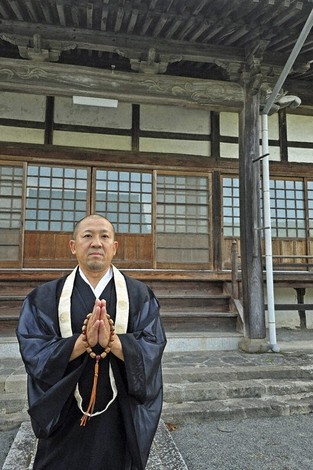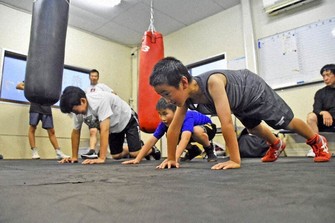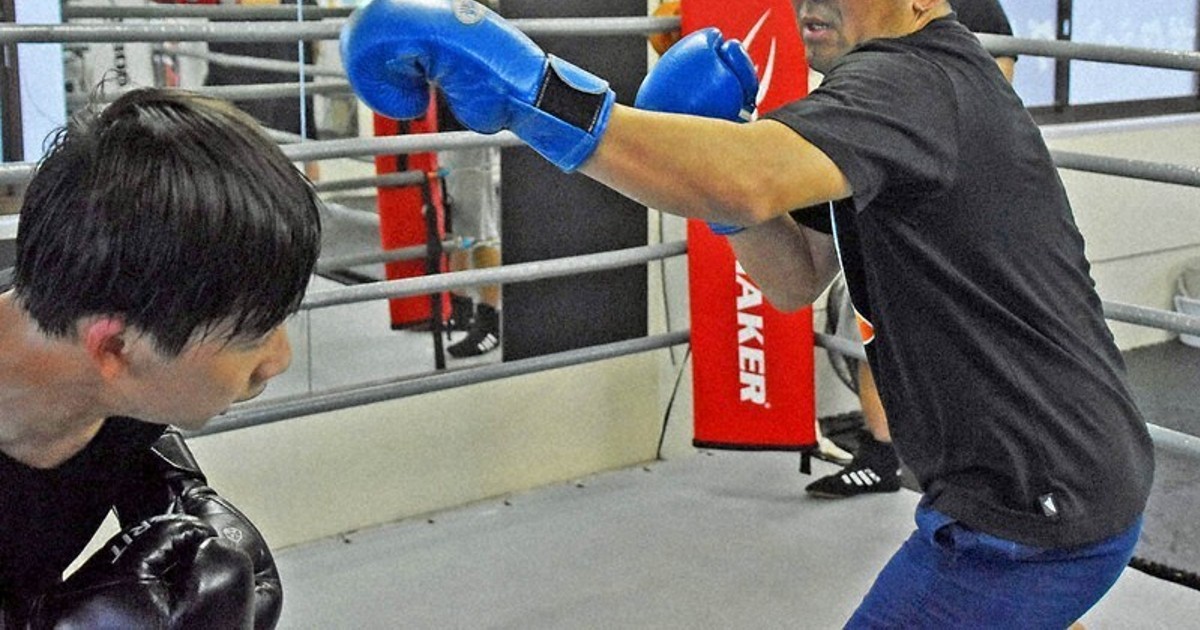BUZEN, Fukuoka — Along a prefectural road 1 kilometer east of the local city hall lies a small boxing gym, headed by a 48-year-old priest of a centuries-old temple in this southwest Japan city.
“The spirit of boxing has something in common with Buddhist teachings,” says Chiyuki Yanaru, the chief priest of Raigoji temple of the Shinshu Otani sect of Buddhism, who also leads the namesake Raigoji Boxing Club. Yanaru dispelled skepticism about the seemingly unusual combination of being a boxing trainer and a monk at the same time.
“Yes, a one-two!” “Nice punch!” Yanaru’s voice echoed through the boxing club in Buzen, Fukuoka Prefecture, as he guided his disciples in the approximately 40-square-meter facility complete with a ring and sandbags. Bang, bang — the sounds of gloves and mitts hitting each other could be constantly heard.
The gym opens three times a week, from 6 p.m. Some 20 students, with ages ranging from 3 — Yanaru’s second son Seon — to their 60s, sweat it out for around two hours. According to the Tokyo-based Japan Boxing Federation, there is apparently no other boxing gym operated by the chief priest of a temple in Japan.

Chiyuki Yanaru, head priest of Raigoji temple, poses in front of the temple’s main hall, in Buzen, Fukuoka Prefecture, on July 10, 2025. (Mainichi/Yoshihisa Deki)
Born as the eldest son of his predecessor, Yanaru was expected to succeed to the temple with more than 400 years of history. He initially refused to follow in the footsteps of his father, insisting, “I don’t want to be on a set rail.” But he changed his mind upon hearing his grandfather say from his sickbed when Yanaru was a second-year high school student, “You were born to a temple and have been given the opportunity to face up to Buddha. Try to think about what that means.”
After graduating from a Buddhist junior college, Yanaru started working at a temple in Nagasaki when he was 22. A complete stranger with no friends around, he joined a local boxing gym near his home to kill time after his service at the temple.
He was confident in his physical strength, having devoted himself to athletics in junior high and then baseball in high school and junior college. Just three months after joining the gym, he found himself sparring for the first time, only to be beaten out by a high schooler. He was frustrated and his fighting spirit was ignited.
He worked out at the gym for two hours every day. When he had wakes and funeral services to perform, he would work hard on roadwork and shadowboxing after coming home. He found boxing fascinating, as it involved not just power but also breathing, timing, speed and using strategy against the opponent. “It was simply interesting,” he said, as he recounted how he discovered that boxing was an intelligent sport that constantly requires calm judgment.
He distinguished himself in the featherweight division (up to 57 kg) and represented Nagasaki Prefecture in the National Athletic Meet for four consecutive years starting in 2002. He placed third nationally at the 2005 National Athletic Meet held in Okayama Prefecture.
After spending five years in Nagasaki, he moved to a temple in Yukuhashi, Fukuoka Prefecture. Although he intended to quit boxing, he ended up making his professional debut at 30 as he could not turn down an offer. He appeared in three bouts as a “two-way player” — a monk and a pro boxer. He also appeared in the main bout.

Students of Chiyuki Yanaru sweat it out during training, in Buzen, Fukuoka Prefecture, on July 4, 2025. (Mainichi/Yoshihisa Deki)
After turning pro, he began teaching boxing to children at the request of a fitness club in Buzen, where he had been commuting to train.
“Each child has their own excellence, and it’s my role to develop those strengths,” he thought, as he found it rewarding to teach boxing, a profession he realized has an affinity with his monkhood serving Buddha.
In 2016, he became the 17th-generation head priest of Raigoji temple at age 39. He managed to open the gym of his dreams in March 2022 with the help of those around him.
He often cannot make it to training for his students due to wakes and funeral services. In those cases, the parents of children who come to practice at the gym help out with training.
At times, people ask Yanaru with surprise, “How can a temple run a boxing gym?” He replies, “While you punch the opponent in boxing, you also understand their pain. Once a match is over, both applaud each other’s efforts, and there is this underlying spirit of mutual respect. This is common to Namu Amida Butsu, a chant for the Jodo Shinshu sect of Buddhism, which means mutually respecting each other.”
Boxing also begins and ends with a formal greeting, showing respect for others and observing rules of etiquette. Yanaru hopes that his students will cultivate their human potential through sessions at the gym.
For inquiries about the gym, call Raigoji Boxing Club at: 090-2588-4989.
(Japanese original by Yoshihisa Deki, Buzen Resident Bureau)

